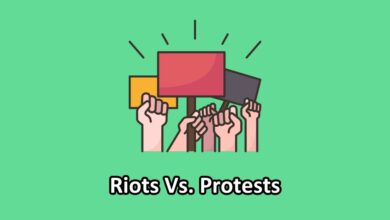In the realm of political and social sciences, the terms “State” and “Society” hold distinct meanings. The State typically refers to a centralized political organization with the authority to govern a specific territory. It exercises control, enforces laws, and maintains order. On the other hand, Society encompasses the collective of individuals who share a common culture, interact within a given social structure, and establish relationships.
Understanding the nuances between these entities is crucial for navigating the complex dynamics that shape our communities.
While the State dictates laws and policies, Society comprises the individuals directly affected by these regulations. A clear understanding of this distinction empowers individuals to engage in meaningful civic discourse, contribute to policy discussions, and comprehend the intricate interplay between governance and the everyday lives of citizens.
State vs. Society (Comparison Chart)
| Factors | State | Society |
|---|---|---|
| What are They? | The State typically refers to a centralized political organization with the authority to govern a specific territory. | Society encompasses the collective of individuals who share a common culture, interact within a given social structure, and establish relationships. |
| Authority and Governance | The State holds the authority to govern, enact laws, and enforce regulations. | A society comprises individuals who live under the governance of the State. |
| Institutions vs. Relationships | The State is characterized by the presence of formal institutions, such as government bodies and the judiciary. | Society is shaped by a network of informal relationships and interactions among individuals, contributing to its complex and dynamic nature. |
| Enforcement vs. Adherence | The State wields the power to enforce laws through a system of legal mechanisms, employing agencies and institutions for the maintenance of order and justice. | Society adheres to these laws not only due to enforcement but also through a shared understanding of acceptable behavior, fostering a sense of collective responsibility. |
| Policy Formulation vs. Cultural Dynamics | The State engages in policy formulation driven by legal frameworks and regulatory measures, responding to societal needs and challenges through structured decision-making processes. | Society is influenced by cultural dynamics, values, and societal norms, which play a crucial role in shaping behaviors and attitudes outside the formal realm of policy. |
| Legitimacy and Recognition | The State derives its legitimacy from established legal and constitutional frameworks, providing a structured foundation for authority and governance. | Society's cohesion is grounded in shared values, traditions, and social contracts, which contribute to the recognition of its collective identity and mutual understanding among its members. |
What is the State?
The State represents a centralized political entity with the legitimate authority to govern a specific geographic area. It typically comprises institutions such as the government, judiciary, and military.
The State’s primary functions include maintaining order, protecting citizens, and administering justice. Its authority is recognized by the populace through legal and constitutional frameworks.
Functions and Responsibilities
- Legislation and Regulation: The State formulates and enforces laws that regulate the conduct of individuals and entities within its jurisdiction. This includes criminal laws, civil codes, and regulations governing various sectors.
- Security and Defense: Ensuring the safety of its citizens is a fundamental responsibility of the State. This involves maintaining a military force and law enforcement agencies to protect against external threats and internal disturbances.
- Justice and Judiciary: The State provides a legal framework through courts and judicial systems. It adjudicates disputes, interprets laws, and ensures justice is served in accordance with established legal principles.
- Public Services and Welfare: States are responsible for providing essential public services such as education, healthcare, and infrastructure. They play a crucial role in fostering the overall well-being and development of society.
What is Society?
Society encompasses the intricate web of relationships and interactions among individuals who share common values, norms, and cultural practices. It is a dynamic collective that forms the foundation of human coexistence and social organization.
Social Structures and Institutions
Within society, social structures and institutions emerge to organize and govern behavior. These include family units, educational systems, economic frameworks, and religious organizations. These structures provide stability and a framework for individuals to navigate their roles and relationships within the larger societal context.
Key Differences Between State and Society
- Authority and Governance: The State holds the authority to govern, enact laws, and enforce regulations, while society comprises individuals who live under this governance.
- Institutions vs. Relationships: The State is characterized by formal institutions such as government and judiciary, whereas society is defined by informal relationships and interactions among individuals.
- Enforcement vs. Adherence: The State enforces laws through legal mechanisms, while society adheres to these laws through a shared understanding of acceptable behavior.
- Policy Formulation vs. Cultural Dynamics: The State engages in policy formulation based on legal frameworks, while society is influenced by cultural dynamics, values, and societal norms.
- Legitimacy and Recognition: The State derives its legitimacy from legal and constitutional frameworks, whereas society’s cohesion is grounded in shared values, traditions, and social contracts.
Interplay Between State and Society
The relationship between the State and Society is dynamic and multifaceted. While the State influences society through legislation and governance, society, in turn, shapes the State by influencing political ideologies, public opinion, and societal norms.
Impact of State Policies on Society
State policies have profound implications for society. Whether in the realms of economics, education, or healthcare, government decisions directly impact the daily lives of citizens. Understanding this interplay allows individuals to advocate for policies that align with their values and address societal needs.
Role of Society in Shaping the State
Society, through collective action and advocacy, holds the power to influence the State. Movements, protests, and civic engagement can shape policies, challenge existing norms, and bring about systemic change. Recognizing the reciprocal nature of this relationship is crucial for fostering a healthy and responsive governance system.
Conclusion
In navigating the intricate tapestry of governance and societal dynamics, understanding the distinct roles of the State and Society is indispensable. This awareness empowers individuals to actively participate in civic discourse, advocate for change, and contribute to the continuous evolution of a just and responsive society.
As we embrace the symbiotic relationship between the State and Society, we pave the way for a more harmonious coexistence and a flourishing democratic ethos.



